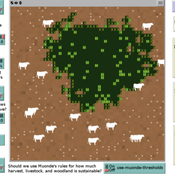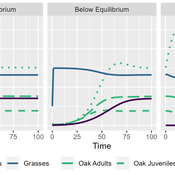As a data scientist, I employ a variety of ecoinformatic tools to understand and improve the sustainability of complex social-ecological systems. I also apply Science and Technology Studies lenses to my modeling processes in order to see potential ways to make social-ecological system management more just. I prefer to work collaboratively with communities on modeling: teaching mapping and modeling skills, collaboratively building data representations and models, and analyzing and synthesizing community-held data as appropriate. At the same time, I look for ways to create space for qualitative and other forms of knowledge to reside alongside quantitative analysis, using mixed and integrative methods.
Recent projects include: 1) Studying Californian forest dynamics using Bayesian statistical models and object-based image analysis (datasets included forest inventories and historical aerial photographs); 2) Indigenous mapping and community-based modeling of agro-pastoral systems in rural Zimbabwe (methods included GPS/GIS, agent-based modeling and social network analysis); 3) Supporting Tribal science and environmental management on the Klamath River in California using historical aerial image analysis of land use/land cover change and social networks analysis of water quality management processes; 4) Bayesian statistical modeling of community-collected data on human uses of Marine Protected Areas in California.
Peer reviewed Zimbabwe Agro-Pastoral Management Model (ZAPMM): Musimboti wevanhu, zvipfuo nezvirimwa
M.V. Eitzel Kleber Tulio Neves Jon Solera Kenneth B Wilson Abraham Mawere Ndlovu Aaron C Fisher André Veski Oluwasola E Omoju Emmanuel Mhike Hove | Published Tuesday, June 19, 2018This model has been created with and for the researcher-farmers of the Muonde Trust (http://www.muonde.org/), a registered Zimbabwean non-governmental organization dedicated to fostering indigenous innovation. Model behaviors and parameters (mashandiro nemisiyano nedzimwe model) derive from a combination of literature review and the collected datasets from Muonde’s long-term (over 30 years) community-based research. The goals of this model are three-fold (muzvikamu zvitatu):
A) To represent three components of a Zimbabwean agro-pastoral system (crops, woodland grazing area, and livestock) along with their key interactions and feedbacks and some of the human management decisions that may affect these components and their interactions.
B) To assess how climate variation (implemented in several different ways) and human management may affect the sustainability of the system as measured by the continued provisioning of crops, livestock, and woodland grazing area.
C) To provide a discussion tool for the community and local leaders to explore different management strategies for the agro-pastoral system (hwaro/nzira yekudyidzana kwavanhu, zvipfuo nezvirimwa), particularly in the face of climate change.
Peer reviewed Theoretical Model of Oak Persistence Under Competition and Herbivory
M.V. Eitzel | Published Tuesday, October 25, 2022This model is intended to support oak tree management by representing the dynamics of oaks in multiple life stages and their competitors and consumers. This is implemented using a differential equation-based theoretical model representing three life stages of oaks: seedlings, juveniles, and adults. It includes the population dynamics of seedlings transitioning to juveniles, juveniles to adults, and adults producing new seedlings, as well as survival rates for each of the stages. It also includes a model of competition for light and water within seedlings and between seedlings and annual grasses. Finally, there is a predation term representing herbivores eating seedlings and grasses, using a Holling Type II (satiating) response with interference for predators and a death rate which depends on the resource extraction rate.
Under development.

